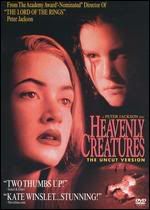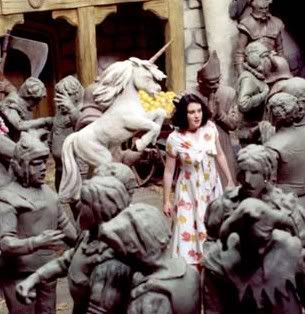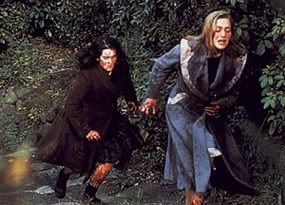
Finally, by some divine hands reaching down into my Queue and lighting fire into the DVD's donut-hole-center, Heavenly Creatures arrived in my mailbox the other day. This was the rare instance of me going into a movie with virtually zero prior knowledge or spoilers read. All I knew was that Jackson co-wrote the script after researching the hell out of a 1954 murder case out in New Zealand, in which two teenage girls killed the one girl's mother but were soon captured after the daughter's diaries were discovered. What I didn't know was that the two girls, Pauline (middle name Yvonne, which she's frequently called) and Juliet (played by Kate Winslet, in her feature film debut) , shared a lesbian love that was rooted in deeply disturbed delusions, heightened through a fairy tale novel they were dreaming up together. Peter Jackson, who had previously proven himself a master of over-the-top gore spectacles with flicks such as 1994's Dead Alive, used Heavenly Creatures as a creative departure of sorts---a slick choice of subject, too, since this film does include a few scenes of carnage, and an overall sense of growing disturbia that Jackson plays like a colorful toy.
Watching Heavenly Creatures, you can see the seeds being planted for Jackson's eventual Lord of the Rings-era excellence. Particularly in two sequences: the first, a daring, unique tracking shot through a sand castle, with the camera zooming through the sandy corridors and up the staircases at a dreamlike clip; and especially in scenes where the girls daydream of prancing around with the mythical characters of their novel, medieval power-players depicted in life-size clay form in Jackson's eyes. Rarely has losing one's mind felt as innocently wonderous as it does here. As if it's Laurel Hardy's March of the Wooden Soldiers (a childhood holiday favorite of mine). This one comes during Pauline/Yvonne's first sexual experience:

The most impressive aspect of this film, however, falls more into the writing department than solely directing. On paper, this story most likely reads as an international equivalent to something along the lines of Harmony Korine's Bully, another "escalating revenge plot" based-on-true-events narrative. Bully took a much more straightforward, bleak approach to its rising homicidal tendencies; Heavenly Creatures, on the other hand, basks in the---mostly in Yvonne's unhappy head--- are presented as joyous, transcendent forms of escapism. Playful, even. As the story progresses, though, and the murder plan starts to show itself, Jackson slowly pulls back from the fun-side and embraces the darkness. It's so subtle how he does it. Until the final 15 minutes, it's invisibly handled. Only when the girls go off on a day-trip with Yvonne's mother does Jackson show his death-in-all-its-horror card.

The focus on expanding insanity can also be seen as an ironic counterpoint to the age-old, Proposition 8-related idea that homosexuality goes hand in hand with madness. Total bullshit, of course, but a discussion that Jackson comments on with a firsthand sense of objectivity. Heavenly Creatures seems to agree with the anti-homosexuality prosecution whenever the girls' parents take centerstage, but then switches back to defending such a sexual choice through euphoric exchanges between the female leads. It's an interesting back-and-forth, one that is up for debate (if anybody out there has seen this film and is down to chat).
I'd love to describe the entire final sequence in all its blindsiding force, but I'd rather allow others to check the film out for themselves and feel similarly pistol-whipped from their closed-eye's side. Just know that Heavenly Creatures is one of the most peculiar, fascinating, and creatively diesel studies of madness that I've seen. Even inspirational in many ways, as well as motivational, but I won't get into the reasons as to why here, now. Saving that for later. Jackson's best film (in my opinion, this one is better than the Lord of the Rings series, but that's a matter of preference) shows that pitch-black issues can be covered in shiny cloth and still maintain the integrity. Well done, sir. Well done.
I'm now even more intrigued to see Jackson's upcoming The Lovely Bones adaptation; Heavenly Creatures is about the closest piece of evidence available that the man is capable of bring Alice Sebold's equal parts melancholy and hopeful book to life. I'm ready. Bring it on.




No comments:
Post a Comment